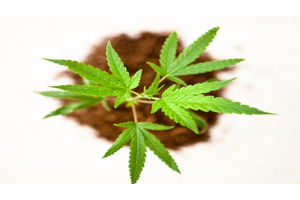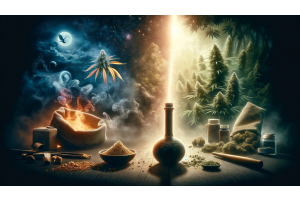Blog
-
April 19, 2024
Dive into the history, chemical properties, and cultural impact of Cannabis. Discover its medical benefits, recreational uses, and how it affects the mind and body. Learn about its legal status across the globe and its various consumption methods.
-
April 17, 2024
This is a common name in the cannabis world. If you listen to hip-hop or watch movies, you may have come across this term severally.
This article will help you understand Thai Stick weed in detail and explain everything you need to know about it. So buckle up and let’s get started!
-
April 15, 2024
Investigating the role of cannabis in treating anorexia nervosa, focusing on THC and CBD's effects on appetite and the endocannabinoid system. Ongoing research explores cannabis' potential benefits and challenges in therapy.
-
April 11, 2024
This article delves into the burgeoning medicinal cannabis industry in Europe, highlighting recent regulatory changes, the role of the UN, and the diverse legal frameworks across countries. It examines the categorization of cannabis-based products, the approval process for medicinal use, and the implications of new laws in Germany and beyond, offering a comprehensive overview of the industry's current state and future prospects.
-
April 08, 2024
Unveil healthier smoking options with the top 10 tobacco replacements for marijuana joints. From the nicotine-free Greengo blend to the therapeutic benefits of Sage and Damiana, learn how to enhance your experience without the harmful effects of tobacco. Perfect for those seeking a pure, potent high.
-
April 05, 2024
This comprehensive guide by a hippie biochemist teaches you to make CBD oil at home. Covering decarboxylation to extraction and storage, it simplifies the process for both novices and enthusiasts, promoting natural wellness through homemade CBD oil.
-
April 03, 2024
Germany moves towards cannabis legalization, reflecting a broader change in Europe. With countries like the Netherlands, Spain, and Malta adjusting policies, Europe's stance on cannabis is evolving, highlighting a shift from punitive measures to a more tolerant approach. This change aims to address public health and reduce the criminalization associated with cannabis use.
-
April 01, 2024
Learn the art of cannabis seed germination using peat and Jiffy pellets. This guide covers everything from selecting healthy seeds to the transplant process, ensuring your cannabis plants have the best start. Find out the advantages of using Jiffy pellets for germination, including tips on maintaining moisture levels and the correct temperature for seedling growth.
-
March 30, 2024
Explore the synergy between CBD and sunscreen for unparalleled skin protection. Learn how CBD's anti-inflammatory and antioxidant properties boost sunscreen effectiveness, offering a holistic approach to safeguarding skin from harmful UV radiation while promoting skin health and rejuvenation.
-
March 29, 2024
Discover the landscape of cannabis regulation in Russia, from prohibitive laws and severe penalties for possession and sale, to emerging discussions on legalizing cannabis for pharmaceutical purposes. Despite a history of hemp cultivation, current laws enforce strict consequences, reflecting Russia's tough stance against drug offenses.
-
March 28, 2024
Explore the evolving world of cannabis-infused cuisine with our top 10 recipes, including cannabutter, cannabis pancakes, and more. Whether you're a novice or a seasoned chef, these dishes from various culinary traditions offer a unique twist on traditional cooking, inviting marijuana enthusiasts to experiment with new flavors and techniques. Dive into the trend that's reshaping the culinary landscape.
-
March 27, 2024
Dive into the history and science of hashish, a potent cannabis concentrate. Understand its types, medical uses, and legal landscape. Learn the differences between hashish and marijuana, and the importance of responsible consumption.
-
March 25, 2024
Dive into the world of ethical cannabis farming, from the transformation of cultivation practices to the ethical production of feminized seeds. Learn about sustainable practices, the pros and cons of feminized seeds, and how companies like Amsterdam Seed Bank are leading the change towards environmentally friendly and consumer-safe cannabis products.
-
March 23, 2024
The US sees unprecedented levels of adult cannabis use, despite federal bans. State legalizations, economic gains, and a notable shift from alcohol highlight the evolving cannabis landscape. The industry's growth, amidst political and legal challenges, reflects changing perceptions and a potential slow march towards federal acceptance.
-
March 22, 2024
Spain's Ministry of Health is advancing towards regulating medicinal cannabis, reflecting on international experiences and aiming for integration into conventional pharmacies. This initiative could transform therapeutic approaches, benefiting patients with serious illnesses by leveraging cannabis' analgesic and appetite-stimulating effects.
-
March 21, 2024
Discover the unique story of California's "marijuana nuns," women who cultivate cannabis for healing, not tied to any religion but driven by spirituality and activism. Learn about their journey from the Occupy movement to creating medicinal cannabis products, all while living by a code of spiritual values and seeking systemic change.
-
March 20, 2024
Dive into the controversy of Cannabis sativa vs. indica. This article unravels the scientific truth behind strain differences, exploring genetics, cultural history, and the future of cannabis classification. Discover why the sativa and indica labels may no longer suffice in describing the complexities of cannabis.
-
March 19, 2024
By: Juan Sebastian Chaves Gil
The native cannabis variety known as Beldia or Beldi, whose name derives from "native" or "from here," originates in the Rif mountains in Morocco and is primarily cultivated to produce kif, intended for international sale. The most famous region for this cultivation is the Ketama valley, also locally known as ktama bladi.
Due to legal restrictions on cannabis in Morocco, this variety has not been the subject of agronomic or botanical studies, making it difficult to determine its origin. Additionally, genetic contamination with foreign varieties brought from Europe and America has made it increasingly challenging to find plants of genetic purity. The introduction of seeds from other varieties in the 2000s, such as the Critikal, has led to a gradual decline
-
March 18, 2024
Discover the stories of five revolutionary figures in cannabis cultivation, from the inventor of sinsemilla to indoor growing innovators. Learn how these pioneers reshaped the landscape of marijuana farming with groundbreaking methods, ensuring their indelible mark on the industry.
-
March 16, 2024
Explore hashish oil, a potent cannabis extract known for its high THC levels. This article covers its production, legal status worldwide, and various consumption methods, offering insights into its popularity and therapeutic potential. Perfect for enthusiasts seeking depth and clarity on cannabis extracts.
-
March 15, 2024
France is witnessing a transformative period in its drug policy, increasingly accepting the use of medicinal cannabis. With trials and new regulations, the country aligns with a global trend, balancing public health and individual freedom. This evolution represents a broader European and worldwide movement towards recognizing cannabis's medicinal value.
-
March 14, 2024
Dive into the tobacco vs. cannabis debate, examining myths, realities, and health implications. Discover the role of cannabinoids, risks of smoking, and the potential of alternatives like vaporization and edibles. This comprehensive analysis aims to provide clarity on the health impacts of these substances, shedding light on societal and cultural dimensions.
-
March 13, 2024
Morocco's Alhucemas region celebrates the legalization of Beldia cannabis, a move by ANRAC promising economic revitalization and improved farmer livelihoods. This historic decision paves the way for sustainable agricultural practices and positions Morocco as a leader in the legal cannabis market, focusing on cosmetics and pharmacology sectors. The initiative reflects Morocco's progressive approach to cannabis regulation and its potential global impact.
-
March 12, 2024
Explore the intricacies of hashish quality, from traditional and modern production methods to legal considerations. Understand quality indicators like aroma, texture, and combustion to identify high-quality hashish. Dive into the article for a comprehensive guide on distinguishing hashish quality, including visual, tactile, and psychoactive aspects, along with legal and safety tips.
-
March 12, 2024
Embrace the lunar calendar for your 2024 cannabis cultivation. This guide reveals how moon phases influence planting, pruning, and harvesting, ensuring a bountiful yield. Understand the best times for each stage to maximize plant health and productivity. A blend of ancient wisdom and modern cultivation techniques awaits.
-
March 11, 2024
Marijuana liqueur, a mixology marvel, combines cannabis with traditional spirits, sparking debates on legality and effects. As it gains traction in places where cannabis is legal, concerns about abuse and therapeutic benefits arise, pointing to the need for further research and responsible consumption.
-
March 07, 2024
Cannabis tea is gaining popularity among athletes for its potential to enhance performance and aid recovery. With anti-inflammatory and analgesic properties, it offers a natural alternative to traditional supplements. Experts underline the need for further research and regulatory clarity.
-
March 05, 2024 1
Juan Sebastian Chaves Gil delves into the hash and weed debate, comparing their production, effects, flavors, and legal status. Find out which cannabis form suits your preferences and why.
-
March 04, 2024
Unveiling a revolutionary approach in the fight against cancer, this article delves into the emerging role of cannabis-based treatments. Highlighting the scientific breakthroughs and patient experiences, it presents a hopeful alternative to traditional therapies, emphasizing the benefits of compounds like CBD and THC in cancer care.
-
February 14, 2024
Explore Colombia's significant strides in cannabis legalization. Delve into the ongoing debates in Congress, the intricate process of constitutional reform, and the diverse perspectives shaping this crucial shift. Stay informed about the latest developments in Colombia's path to legalizing cannabis.









